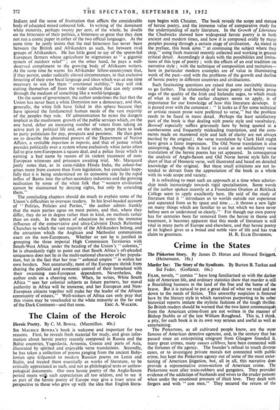The Claim of the Heroic
Heroic Poetry. By C. M. Bowra. (Macmillan. 40s.) SIR MAURICE BOWRA'S book is welcome and important for two reasons. First, he reveals fresh material for study, and gives infor- mation about heroic poetry recently composed in Russia and the Baltic countries, Yugoslavia, Armenia, Greece and parts of Asia, illustrated by spirited and enjoyable verse translations. Secondly, he has taken a collection of poemsranging from the ancient Baby- lonian epic Gilgamish to modem Russian poems on Lenin and Stalin, and treated them essentially as works of literature, to• be critically appreciated as such, and not as philological texts or anthro- pological documents. Our own heroic poetry of the Anglo-Saxon period meets wit4 such appreciation all too seldom, and to see it as part of the heroic poetry of Europe may give a truer sense of perspective to those who grew up with the idea that English litera- ture begins with ChaUCer. The book reveals the scope and stature of heroic poetry, and the immense value of comparative study for the understanding of early literature. In the Growth of Literature the Chadwicks showed how widespread heroic poetry is in both ancient and modern times, and how it is composed orally by many peoples passing through a certain stage of civilisation. As, stated in the preface, this book aims 4.` at continuing the subject where they stop," using fresh material recently collected and working in greater critical detail. Accordingly it deals with the possibilities and limita- tions of this type of poetry ; with the effects of an oral tradition on narrative style ; with the technique of composition and recitation— here in particular modern examples are of value in illuminating work of the past—and with the problems of the growth and decline of heroic poetry in different countries and civilisations.
Such fascinating questions are raised that one inevitably desires to go further. The relationship of heroic poetry and heroic prose saga of the quality of the Irish and Icelandic sagas, to which much of what is said in the earlier chapters seems to apply, is of importance for our knowledge of how this literature develops. It is passed over with the comment : " It looks as if for some technical or artistic reason prose were preferred to verse," but the problem needs to be faced in more detail. ,Perhaps the least satisfactory part of the book is that dealing with poetic style and vocabulary. Beowulf especially suffers grievously here by being quoted in a cumbersome and frequently misleading translation, and the com- ments made on mannered style and lack of clarity are not always merited by the original ; the verse translation by Clark Hall might have given a fairer impression. The Old Norse translation is also uninspiring, though this is hard to avoid as no satisfactory verse translation of the heroic poems has yet appeared. In consequence the analysis of Anglo-Saxon and Old Norse heroic style falls far short of that of Homeric verse, well illustrated and based on detailed knowledge of the original. But these small criticisms are not in- tended to detract from the appreciation of the book as a whole with its wide scope and variety.
It is refreshing to meet such an approach at a time when scholar- ship tends increasingly towards rigid specialisation. Some words of the author spoken recently at a Foundation Oration at Birkbeck College seem to apply excellently here. He said of the study of literature that it " introduces us to worlds outside our experience and separated from us by space and time it throws a new light on many things which are familiar to us but which we have never before seen or understood so clearly." • For though our own poetry has for centuries been far removed from the heroic in theme and treatment, it becomes apparent that this mode of literature is still vital in many parts of Europe and elsewhere, and that heroic poetry at its highest gives us a broad and noble view of life and has true


































 Previous page
Previous page